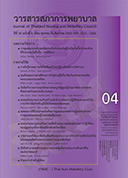Working-Age Northeastern Thai Males’ Perception of Causes of Depression
Keywords:
male, masculinity, major depressive disorder, genderAbstract
Objective: To explain causes of depression as perceived by working-age Northeastern Thai males.
Design: Qualitative research
Methodology: This study was conducted in Khon Kaen province during March 2019 to April 2020 on 23 working-age Northeastern Thai males diagnosed with major depressive disorders. These key informants were recruited by means of purposive sampling, the main inclusion criteria being (i) male, (ii) aged between 18 and 59 years, and (iii) without severe mental symptoms. Data were collected using in-depth interviews, which were audio-recorded. Content analysis based on Colaizzi’s approach was employed to analyse the data.
Results: In the working-age Northeastern Thai males’ perception, depression resulted from a number of causes, namely, 1) failure to succeed in their expected roles; 2) failure to build financially secure families; 3) relationship problems with life partners; 4) feeling that their lives were being controlled; and 5) childhood abuse.
Recommendations: Masculinity is linked to the causes of male depression. Therefore, development of male depression prevention approaches requires educating the public, especially men, to realise the effects of rigidly fixated ideas of masculinity on occurrence of depression. In addition, there is an urgent need to develop gender-sensitive psychosocial interventions and to promote greater flexibility in the perception of gender norms and roles.
Downloads
References
Phasrimahabodi Hospital. Report of access service of patients with depression in the fiscal year 2020. [Internet] 2020 [cited 2020June 20]; 1-7. Available from: https://thaidepression.com/www/report/main_report/(in Thai)
World Health Organization [WHO]. Depression and other common mental disorders: Global health estimates. Geneva: Switzerland; 2017.
World Health Organization [WHO]. The global burden of disease: 2004 update. [Internet] 2008 [cited 2017 Feb 5]. Available from:https://www.who.int/healthinfo/global_burden_disease/2004_report_update/en/33
Kusreesakul K, Kittirattanapaiboon P, Makka N,Bundhamcharoen K. The burden of mental and alcohol/substance use disorders in Thailand 2014. Journal of Mental Health of Thailand 2018; 26(1):1-15.(in Thai)
Department of Mental Health. Report the number of suicides in Thailand. [Internet] 2020 [cited 2020 May 5]. Available from: https://www.dmh.go.th/report/suicide. (in Thai)
Agree E, Bissett B, Rendall MS. Simultaneous care for parents and care for children among mid-life British women. Population Trends 2003; 112: 29-35.
Natrujirote W. A study of sandwich role of working generations in multigenerational family. Journal of Politics and Governance 2017; 7(2): 355-72. (in Thai)
Chuick CD, Greenfeld JM, Greenberg ST, Shepard SJ, Cochran SV, Haley JT. A qualitative investigation of depression in men. Psychology of Men and Masculinity 2009; 10(4): 302-13.
Danielsson U, Johansson EE. Beyond weeping and crying: a gender analysis of expressions of depression. Scand J Prim Health 2005; 23(3): 171-7.
Emslie C, Ridge D, Ziebland S, Hunt K. Men’s accounts of depression: reconstructing or resisting hegemonic masculinity?. Soc Sci Med 2006; 62(9): 2246-57.
Chan JD. “Male Gender Role Strain”: A pastoral assessment [dissertation]. South Africa. University of Stellenbosch. 2009.
Rungreangkulkij S, Kotnara I, Kittiwatanapaisan W, Arunpongpaisal S. Explanatory model based on perspectives of patients with depressive disorder. Journal of Psychiatric Association of Thailand 2013;58(1): 29-40. (in Thai)
Khuankaew O. Path to change gender and justice based on spirituality and learning by heart. 2nd ed. Bangkok: October print; 2015. (in Thai)
Fazli Khalaf Z, Low WY, Ghorbani B, Merghati Khoei E. Perception of masculinity amongst young Malaysian men: a qualitative study of university students. BMC Public Health 2013; 13(1): 1062-70.
Ragchan S. ‘Tai Baan The Series’: “Phu Baow Thai Baan” and masculinities in ISAN village, Thailand [dissertation]. Master of Arts (Women, Gender and Sexuality Studies). College of Interdisciplinary Studies, Thammasat University. 2019 (in Thai)
Sribunrueang D, Intharasil S. Maculinity in the characterization of main character in Rompang's Buppaesanniwas. Journal of Graduate MCU Khon Kaen Campus. 2019; 6(1): 431-45. (in Thai)
Dowrick C. Depression as a culture-bound syndrome: implications for primary care. Brit J Gen Pract 2013;63(610): 229-30.
Shosha GA. Employment of Colaizzi’s strategy in descriptive phenomenology: a reflection of a researcher. Eur Sci J 2010; 8(27): 31-43.
Lincoln YS, Guba, EG. Naturalistic inquiry. London: SAGE Publication. 1985.
Som-in A. Northeast worldview. 1st ed. Kalasin: Printing coordination printing house; 1991. (in Thai)
Liengjindathawon O. Rituals of Life Isan people: Birth. [Internet] 2002 [cited 2020 June 13]. Available from: http://www.esanpedia.oar.ubu.ac.th/local information/?p=379(in Thai)
Jongudomkarn D, Komkum S, Maneerat T, Kaewlamoon J. Social construction of parents on pediatric pain expression in the context of Isan. Journal of Nursing Science & Health 2011; 34(4): 22-35. (in Thai)
Montrikul Na Ayuthaya B. The role of women: a perspective in Thai social just. Governance Journal. 2016; 5 (2): 24-37. (in Thai)
Duangwises N. Cultural-bound syndromes. [Internet] 2020 [cited 2020 June 2]. Available from: https://www.sac.or.th/databases/anthropology-concepts/ glossary/2734
Tokar DM, Fischer AR, Schaub M, Moradi B. Masculine gender roles and counseling-related variables: links with and mediation by personality. J Consult Psychol 2000; 47(3): 380-93.
Phaokuntarakorn W. Depression: experiences of Jomtook-pontook among Issan women [dissertation]. Doctor Philosophy in Nursing, Graduate School Khon Kaen University.; 2005. (in Thai)
Rungreangkulkij S, Chirawatkul S, Kongsuk T, Sukavaha S, Leejongpermpoon J, Sutatho Y. Sex or gender leading to a high risk of depressive disorder in women. Journal of Psychiatric Association of Thailand 2012; 57(1): 61-74. (in Thai)
Rungreankulkij S, Kotnara I, Kittiwatanapaisan W, Arunpongpaisal, S. Depressive disorder: gender
analysis of depression. Journal of Nursing Science & Health. 2012; 35(4): 21-30. (in Thai)
Chanpen S. Mul mang dangdeim: The version of Brahman-Phaya Sornphonthip. Kalasin: Prasan Printing; 2001. (in Thai)
Rodsup N. Patriarchy: The reflection of the inequality between male and female in Asian society. Journal of Burirum Rajabhat University 2012; 4(2): 30-46. (in Thai)
Child Protection Foundation. The truth of a child who is abuse, part 1. [Internet] 2018 [cited 2020 May 2].Available from: https://www.thaichildrights.org/articles/ article-violence/ The truth of the right child -2 (in Thai)








